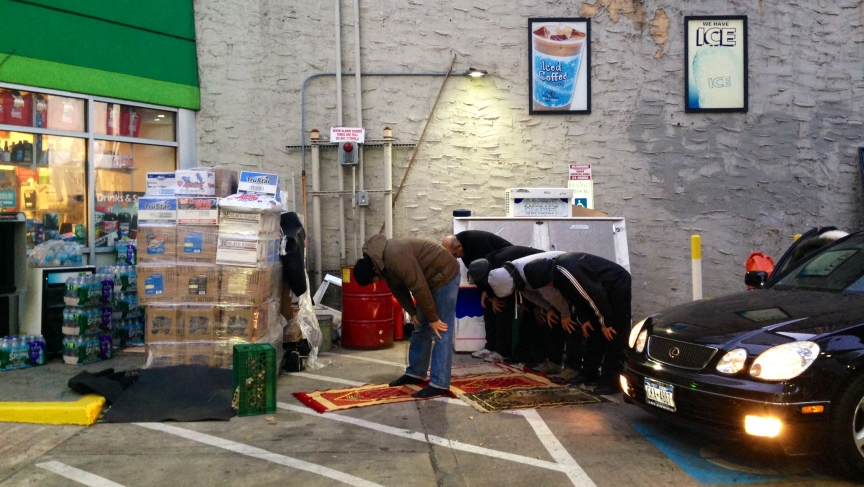by HILLARY BRENHOUSE
 Muslim cab drivers pray at a BP station in downtown Manhattan while patrons pump gas. PHOTO/Hillary Brenhouse
Muslim cab drivers pray at a BP station in downtown Manhattan while patrons pump gas. PHOTO/Hillary Brenhouse
Roughly half of the city’s 40,000-odd cabbies are Muslims who hail from countries all over the Middle East, Africa and elsewhere — and a great number of the drivers are observant, praying five times a day. Which raises the question: How and where do these men on the move pray?
When you spend your days driving a taxicab, it’s impossible to say where, at any given moment, you might wind up. Followers of Islam can perform their five daily prayers in any relatively clean space, even bowed down on the side of the road. But the process isn’t so simple. You first need to ritually wash with water and then to prostrate yourself facing east, toward Mecca.
“That’s why we have an app in our iPhone, we know where is the Mecca,” Youssef Kamal told me. “Right now, I’m here, right? I check my iPhone, check which is the Mecca. Straight to Mecca. Like, I am in Mecca right now. Technology!”
I found Kamal praying alone at the BP gas station on the corner of Houston and Lafayette streets. He’d taken a prayer mat from the cardboard box kept there for drivers, laid it down in front of the pumps and was kneeling in the cold.
It’s best to pray in a group led by an imam, but for a roving driver, that isn’t always a possibility.
“The prayer starts, like, at one o’clock,” said Kamal. “Now it’s 1:15. I’ve been looking for the parking since 12:40. I didn’t find no spot. I turned my wheels to the gas station to perform my prayer. Even, it’s not count 100 percent prayer because you have to be all together. Together is more credit, more reward, than single.”
Parking is the chief anxiety of every observant driver in New York. There are five daily windows for worship, some briefer than others. The prayer itself takes only 10 or 15 minutes to complete, but it must be done on time. Otherwise, it expires.
This is why religiously-committed cabbies will sometimes stop in front of hydrants, double park, triple park, forfeit fares and risk sizable tickets to stick to the day’s ritual schedule, especially on Fridays, when the most significant prayer of the week takes place.
Said Kamal: “We have to pray no matter what. Even you put it in double park. Even you put it in the bus stop. We have to go to pray. It’s like something mandatory.”
Public Radio International for more
(Thanks to reader)
